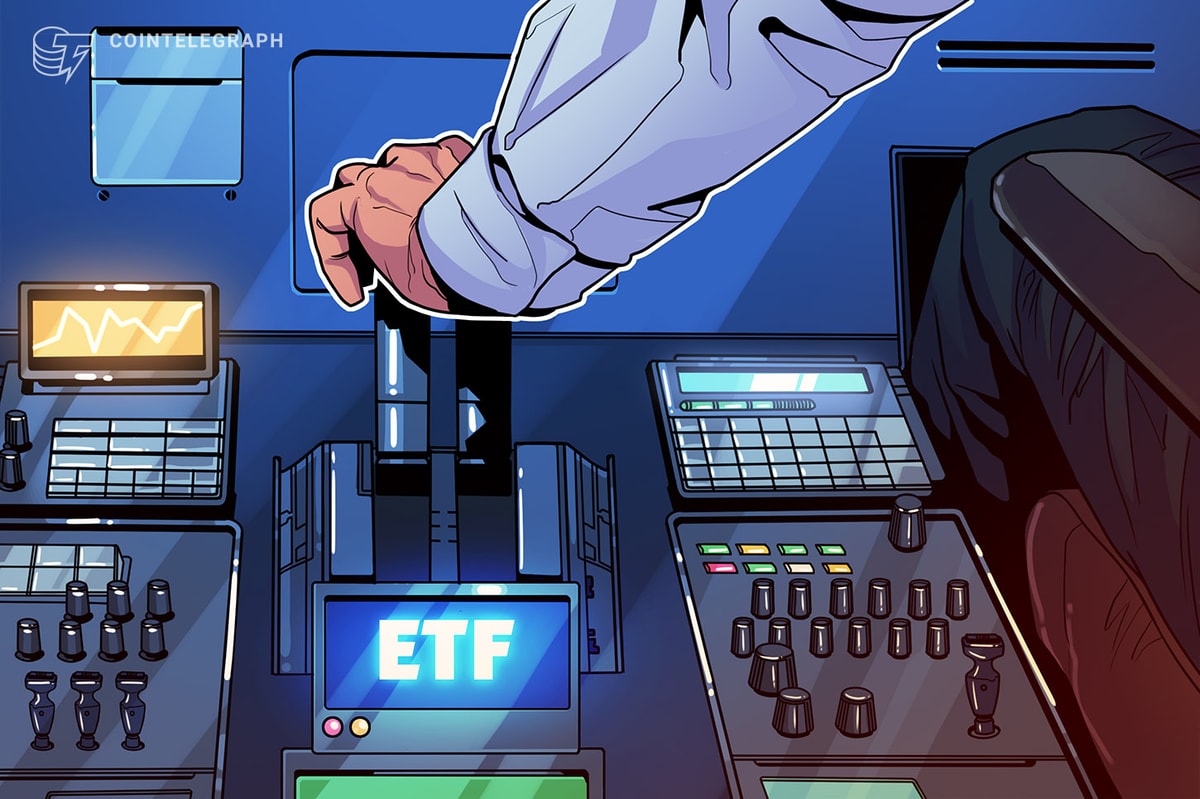On Sept. 17, the Chicago Board Options Exchange’s BZX Equity Exchange withdrew its VanEck/SolidX Bitcoin exchange-traded fund (ETF) proposal a month ahead of the review deadline. The United States Securities and Exchange Commission (SEC) — the regulator on the matter — had until Oct. 18 to greenlight or reject the financial product.
As a result, the race for the first Bitcoin (BTC) ETF seems to be postponed once again. While the SEC is still reviewing two other proposals of this kind, the VanEck/SolidX Bitcoin ETF was generally perceived as the strongest contestant to get regulatory permission and debut this investment vehicle in the U.S. Chances are the industry will not see a crypto-based ETF until 2020 at the earliest.
What is an ETF?
An ETF is a type of investment fund that is tied to the price of an underlying asset — a commodity, an index, bonds or a basket of assets — like an index fund. It is listed and traded on exchanges, normally available to both retail and institutional investors. As of September 2019, ETFs represent a $3.9 trillion market, according to research firm XTF, cited by the Wall Street Journal.
Related: SEC Continues to Stall on BTC ETFs, All in Wait for Breakthrough
A Bitcoin ETF, in turn, would track Bitcoin as the underlying asset. It is an indirect way to purchase cryptocurrency, in which the investor gets the corresponding security without having to hold the actual BTC coins. If listed on a regulated U.S. exchange, a crypto-powered ETF could set the stage for institutional investors, potentially pushing Bitcoin toward the financial mainstream.
However, no player has secured the permission to list a Bitcoin ETF in the U.S. yet, as the SEC has been denying and postponing all attempts to register a Bitcoin-focused financial product in the country. Some of the financial watchdog’s main arguments against approving Bitcoin ETFs include the supposedly “insignificant” size of Bitcoin futures market, as well as the possibility of fraudulent and manipulative acts and practices.
VanEck and SolidX — a persistent candidate for a Bitcoin ETF
Both VanEck, an investment firm, and blockchain-focused financial service company SolidX had tried registering their ETFs separately beforehand — in August 2017 and in July 2016 respectively — but the SEC shut down both attempts. In June 2018, they teamed up and filed a request to list a collaborative Bitcoin-based ETF on the CBOE BZX Equities Exchange, the second-largest U.S. equities market operator.
The fund is tied to VanEck's subsidiary index MVIS, which will ostensibly calculate the real-time price of BTC based on executable bids and asks derived from U.S.-based crypto over-the-counter (OTC) markets instead of more conventional crypto exchanges, with SolidX is sponsoring the project. Each share of the VanEck–SolidX Bitcoin Trust is set to $200,000. SolidX CEO Daniel H. Gallancy previously explained that the high price reflects the fund’s intention to attract institutional rather than retail investors.
In August 2018, the SEC postponed its decision on the listing of the VanEck–SolidX ETF for the first time, citing the unregulated nature of Bitcoin market. In November, representatives from VanEck, SolidX and CBOE met with the SEC to discuss their ETF proposal. According to the memorandum that was released after the meeting, the applicants argued that Bitcoin was in fact more resistant to market manipulation than its traditional counterparts — e.g., crude oil, silver and gold — all of which already have ETFs on the market.
Nevertheless, in December, the SEC delayed its decision again. The agency set a new deadline for Feb. 27, 2019 in order to further review the rule change proposals. However, the next month, CBOE withdrew the ETF application just a few weeks before it would have faced a verdict from the regulator.
As an CBOE spokesperson told Cointelegraph at the time, the decision to pull out was the result of the U.S. government shutdown as the end of the review period on Feb. 27 approached. As Cointelegraph previously reported, the shutdown largely undermine the work of the SEC, among other government agencies.
On Jan. 30, CBOE, VanEck and SolidX resubmitted their proposal, making it approximately 40 pages longer compared to the previous version. Still, in March, May and later in August the SEC delayed its decision. The reasoning stayed the same, as the commission requested more answers to questions related to protecting investors and public interest from fraud and similar exploitations. According to the SEC, the latest postponement pushed the decision for listing the VanEck–SolidX ETF to Oct. 18.
Latest developments: Limited ETF, second withdrawal
In September, VanEck and SolidX started to offer a limited version of their Bitcoin ETF to institutional investors under the SEC’s Rule 144A, which allows the sale of privately placed securities to “qualified institutional buyers,” namely institutions like banks and hedge funds who have at least $100 million in assets. The broker-traded fund is called VanEck SolidX Bitcoin Trust 144A Shares, and according to its official description, it “looks and feels like a traditional ETF.”
Soon after the launch, industry lawyer Jake Chervinsky took to Twitter to argue that the product did not represent a legal ETF. “This is misleading. The VanEck SolidX Bitcoin Trust is *not* an ETF. It looks exactly like the Grayscale Bitcoin Trust, which was launched almost six years ago,” he wrote.
In any case, VanEck SolidX Bitcoin Trust 144A Shares are off to a rough start. As of Sept. 19, the product’s total net assets are only $40,500, which is less than four BTC, according to the current standings of the market. In the latest move of their continual ETF saga, CBOE, VanEck and SolidX pulled their application out for the second time.
“After careful consideration in cooperation with our esteemed client, we have decided to withdraw our filing with the SEC to list and trade shares of the VanEck SolidX Bitcoin Trust,” a CBOE spokesperson told Cointelegraph, adding:
“We continue to believe there are opportunities for Cboe and our clients in the broader cryptocurrency market, and remain open to pursuing ETP and derivative listings and trading.”
Ed Lopez, head of ETF product with VanEck, confirmed to Cointelegraph that “this action doesn’t mean VanEck has given up on its pursuit of a public bitcoin offering.” He elaborated on that statement, saying:
“We still believe investors would be better served having access to bitcoin through a regulated public vehicle. Given the current nature of the regulatory environment, withdrawal of the filing allows us more time to enhance the filing to help better address the concerns of regulators.”
The investment firm did not clarify whether its decision to withdraw was attributed to the performance of VanEck SolidX Bitcoin Trust 144A Shares. Richard Keary, founder of Global ETF Advisors LLC, an independent management consulting firm that specializes in the exchange-traded products industry, doubts that, however. He noted that it “has nothing to do with performance of the 144A shares,” during an email conversation with Cointelegraph, adding:
“This is just a procedural process. Withdrawing before it gets rejected, allows them to submit a new filing and start the clock ticking all over again. So, this filing/approval process will continue.”
Nevertheless, it is unclear when VanEck et al. are planning to submit their ETF proposal, as the regulatory environment remains largely cautious about the idea. Earlier this month, the SEC Chairman Jay Clayton told CNBC that although significant steps have been taken to address regulatory concerns surrounding Bitcoin ETFs, there is “work left to be done.” Clayton went on to say that the SEC’s concerns were not immaterial:
“People needed to answer those hard questions for us to be comfortable that this was the appropriate type of product.”
Most recently, on Sept. 19, Clayton argued that Bitcoin would require stronger regulation before being listed on major traditional exchanges like Nasdaq or the NYSE. Thus, the SEC’s approval will be largely dependent on the maturity of Bitcoin trading markets, Keary told Cointelegraph:
“Currently not enough volume in the Bitcoin Futures, so another market that needs time to mature and become more robust. Futures are needed as a hedge to the ETF, if there's not enough liquidity for market makers to hedge there will be no liquidity in the ETF.”
The remaining proposals are not likely to make it in 2019
Currently, the SEC is reviewing two other Bitcoin ETF proposals. One of them was submitted by investment management firm Wilshire Phoenix, which aims to include both BTC and U.S. treasury bonds in its trust to make it fund less volatile and hence more favorable in the SEC’s eyes. The company is relatively new to the ETF race, as it first submitted the application in January 2019.
The other filing is backed by cryptocurrency index fund Bitwise Asset Management with NYSE Arca, a top U.S. exchange. Bitwise first applied for a SEC-regulated ETF in July 2018. Per the document, the calculated value of its index will gather the price of Bitcoin based on data collected from around 10 preapproved exchanges. Wilshire Phoenix will hear back from the SEC by the end of September, while the deadline for the latter proposal is set for Oct. 13.
However, the odds seem to be against the remaining proposals. Chervinsky, who has been closely covering the crypto ETF space on Twitter, puts the chance of approval at 0.01%. Stressing that the SEC’s primary complaint is a lack of surveillance-sharing agreements with regulated markets of significant size, he wrote:
“My guess, unfortunately, is that VanEck withdrew its application after becoming convinced that the SEC wouldn't accept its alternative approach to this problem. If that's true, it's *very* hard (though not entirely impossible) to imagine Bitwise's approach faring any better.”
Similarly, Keary, who thought an ETF would be approved this year, now says that he has “no sense on actual timing.” In his opinion, a Bitcoin ETF will happen when the Bitcoin market and Bitcoin futures markets are more mature, more liquid and less volatile. “But, it will happen,” he told Cointelegraph.











